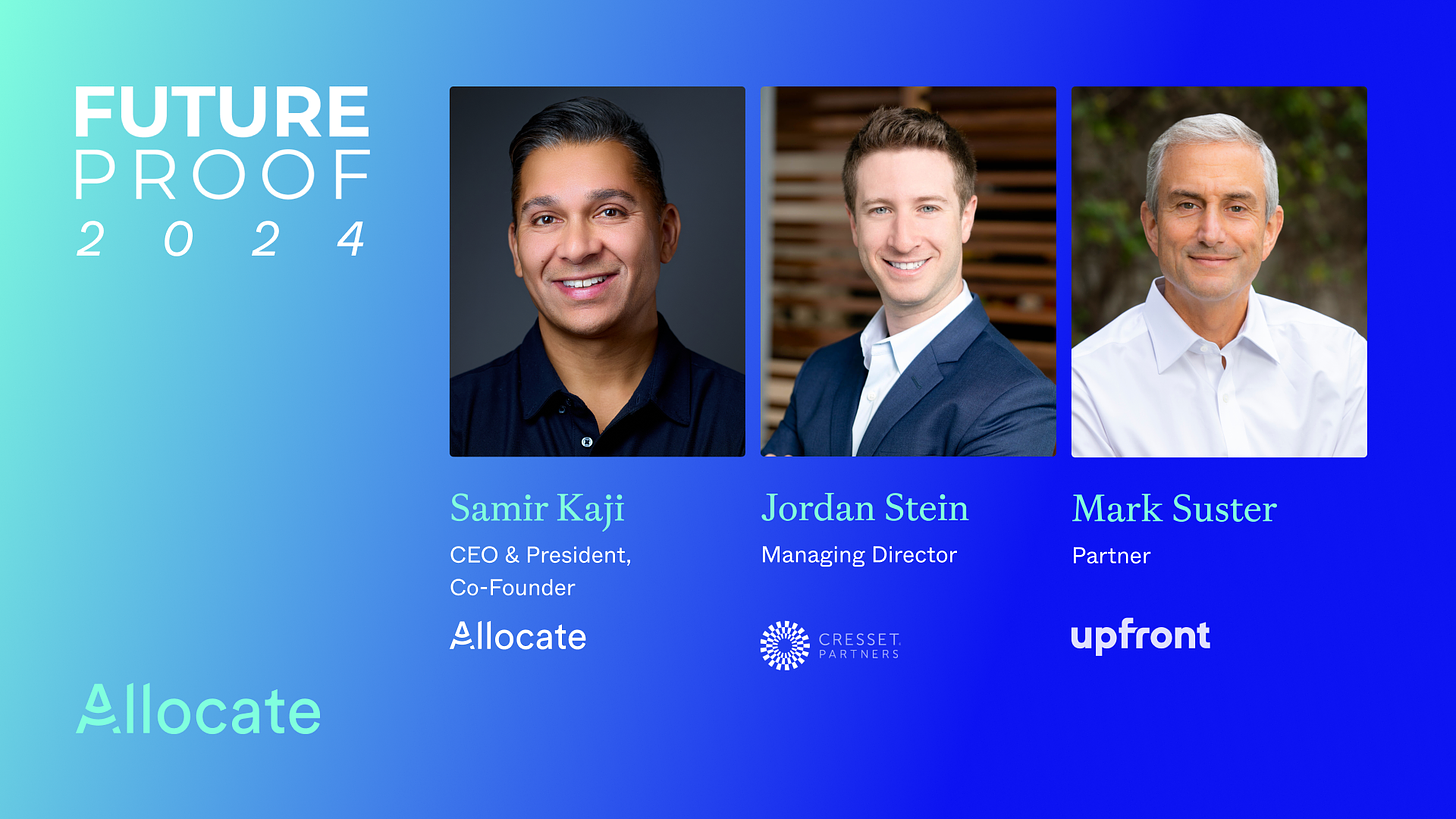Navigating the New Era of Venture Capital: Insights on Liquidity, AI, and the Evolving GP-LP Landscape
From FutureProof 2024 Festival
In a recent episode of the Allocate Podcast, recorded live at this year’s FutureProof Festival, the conversation brought together influential figures in the private markets, in particularly venture capital: Allocate’s CEO, Samir Kaji, Mark Suster of Upfront Ventures, and Jordan Stein of Cresset Partners. The discussion covered fundamental shifts in venture capital (VC) and wealth management, evolving liquidity strategies, artificial intelligence (AI) investment trends, and insights into successful GP-LP relationships. Here is a summary of insights from these key topics discussed:
Key Shifts in Venture Capital
Over the past two decades, venture capital has grown from a niche industry into a massive sector, now encompassing approximately 4,000 U.S.-based VC firms, up from about 800 active firms in 2008. Samir and Mark discussed how this growth reflects both technological ubiquity and capital inflows, with major funds managing billions and investing across various stages, from seed to growth equity. The time horizon for exits has also extended considerably, with companies staying private longer than ever, shifting the landscape from earlier IPO-driven exits to more complex liquidity solutions.
Evolving Liquidity Strategies
Liquidity has become a key focus for VC firms given the extended timelines to public exits. Mark explained Upfront’s approach of selling partial stakes (“strip sales”) in portfolio companies as a way to create earlier returns for investors. These moves, including recent private equity-led recaps, allow firms to balance the potential for upside with timely returns, which is critical in today’s venture landscape. Samir highlighted the industry's shift towards liquidity mechanisms like continuation funds and strip sales to counterbalance the extended timeframes for IPOs and create more predictable cash flows.
Investment Cycle Insights and Market Conditions
On the question of whether it’s a good time to invest, both Samir and Mark emphasized the importance of disciplined investing during market rationalization periods. They discussed the unique opportunities emerging as valuations have normalized since the 2021 peak. While AI continues to attract a significant share of venture dollars, they both noted that valuations for AI investments are inflated and may face correction. Samir mentioned the ongoing need for investor diligence as the landscape bifurcates into companies with differentiated capabilities versus those merely leveraging hype.
Perspectives on Artificial Intelligence
AI investments represent both a present-day overvaluation and a long-term undervaluation. As a horizontal technology, AI is poised to integrate into nearly every sector, but the market is still grappling with inflated valuations. The speakers suggested that true value creation in AI will likely emerge from highly specialized, vertically integrated applications, such as AI models focused on electronic medical records or child development metrics. In contrast, horizontal AI plays are unlikely to outperform giants like Google and Microsoft in the long term.
Keys to Successful GP-LP Relationships
A significant part of the discussion focused on how VCs select their limited partners (LPs). Mark emphasized that he looks for LPs committed to the long-term nature of venture capital, rather than those easily swayed by market cycles. Samir pointed out the need for LPs to maintain vintage diversification and avoid over-allocating in boom years like 2021. LPs need to carefully evaluate GPs’ ability to source, pick, and win the best investments in a highly competitive market.
The discussion concluded with insights on the crucial elements of a successful VC strategy: an adaptive approach to liquidity, thoughtfulness around investment timing, and strategic partnerships with LPs who are aligned with the long-term, cyclical nature of venture investing. This episode provided a rich analysis of the current VC climate, emphasizing that while challenges exist, the ecosystem remains fertile for those who approach it with both caution and conviction.




